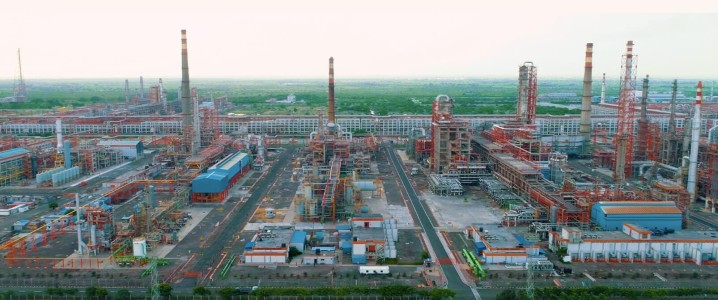Nayara Energy Shifts Focus to Domestic Market Amid EU Sanctions

Private Indian refiner Nayara Energy is undergoing significant changes following its inclusion in European Union sanctions on July 20, 2023. These sanctions, part of the EU’s 18th package targeting Russian entities, are a response to Rosneft owning a 49% stake in Nayara. As a direct consequence, CEO Alessandro Dorides has resigned, with Sergey Denisov, originally from Russia, stepping in as his successor.
The main asset of Nayara Energy is the Vadinar refinery, located in northwest India, which has a processing capacity of 400,000 barrels per day. Historically, this refinery has been oriented towards exports since state-owned refiners are mandated to prioritize the domestic market. Since Rosneft’s entry into Nayara in 2017, which marked the Russian firm’s largest overseas investment at $13 billion, the Vadinar facility has primarily processed Russian crude oil. However, this connection is now a focal point of the EU’s sanctions.
While European markets have never been Nayara’s primary outlet, the company did send significant volumes to the UK, which has not yet imposed any restrictions on Nayara. Data from Kpler indicates that in 2023, 9 out of 19 Europe-bound tankers went to the UK, and in 2024, this figure was 4 out of 8. By 2025, shipments to Europe had decreased to approximately 5% of total output.
Nayara’s recent trade activities provide insight into its pivot towards the Asian market. In July 2023, the first month of sanctions, the Vadinar port loaded 8 tankers with refined products, distributing them to destinations including the UAE, Oman, Singapore, and Pakistan. The UAE-bound shipments were destined for Jebel Ali, which serves Dubai’s domestic market, and Fujairah, a major transshipment hub facilitating discreet rerouting to other markets.
The flexibility of Oman’s Sohar port, which acts as a bunkering center, allows for similar operations. These developments enable Nayara to maintain its export volumes while minimizing the impact of EU restrictions. Notably, Singapore’s trading environment, which prioritizes price and availability over origin, offers a robust outlet for Nayara’s products.
Despite these opportunities, Nayara must confront the long-term implications of its current situation. While markets like Singapore and Fujairah can absorb some of its output, rising freight and logistical costs may compel Nayara to focus more on the domestic market. In response, the company is seeking support from the Indian government, including potential sales through state-owned entities.
One possible buyer for Nayara’s products is Reliance Industries, India’s largest public company. However, Reliance operates the Jamnagar refinery, which is three times the size of Vadinar and is more likely to capture export demand than assist Nayara directly. This dynamic could complicate the relationship between the two private refiners, both of which are based in Gujarat.
With over 6,500 retail stations and plans to add 400 more by 2025, Nayara is strategically positioned to absorb a larger share of its output domestically. What began as a growth initiative is now evolving into a critical buffer against external pressures. If EU sanctions continue and re-export hubs reach capacity, Nayara’s domestic network may become the cornerstone of its operations, ensuring profitability in a shifting geopolitical landscape.
Securing feedstock remains essential for Nayara’s ongoing strategy. In fiscal year 2024-2025, Russian Urals crude accounted for 90% of the refinery’s input, equating to 366,000 barrels per day. However, since the sanctions were enacted, incoming flows have diminished significantly. Kpler’s data reveals that crude arrivals in August 2023 totaled just 3 million barrels, all sourced from Russian oil.
Although Nayara’s imports are expected to decrease, several cargoes owned by Rosneft are still heading to Vadinar, indicating that the Russian company intends to maintain its supply to Nayara despite the sanctions. The ongoing developments signal a critical period for Nayara Energy as it navigates a complex landscape shaped by geopolitical tensions and changing market dynamics.






